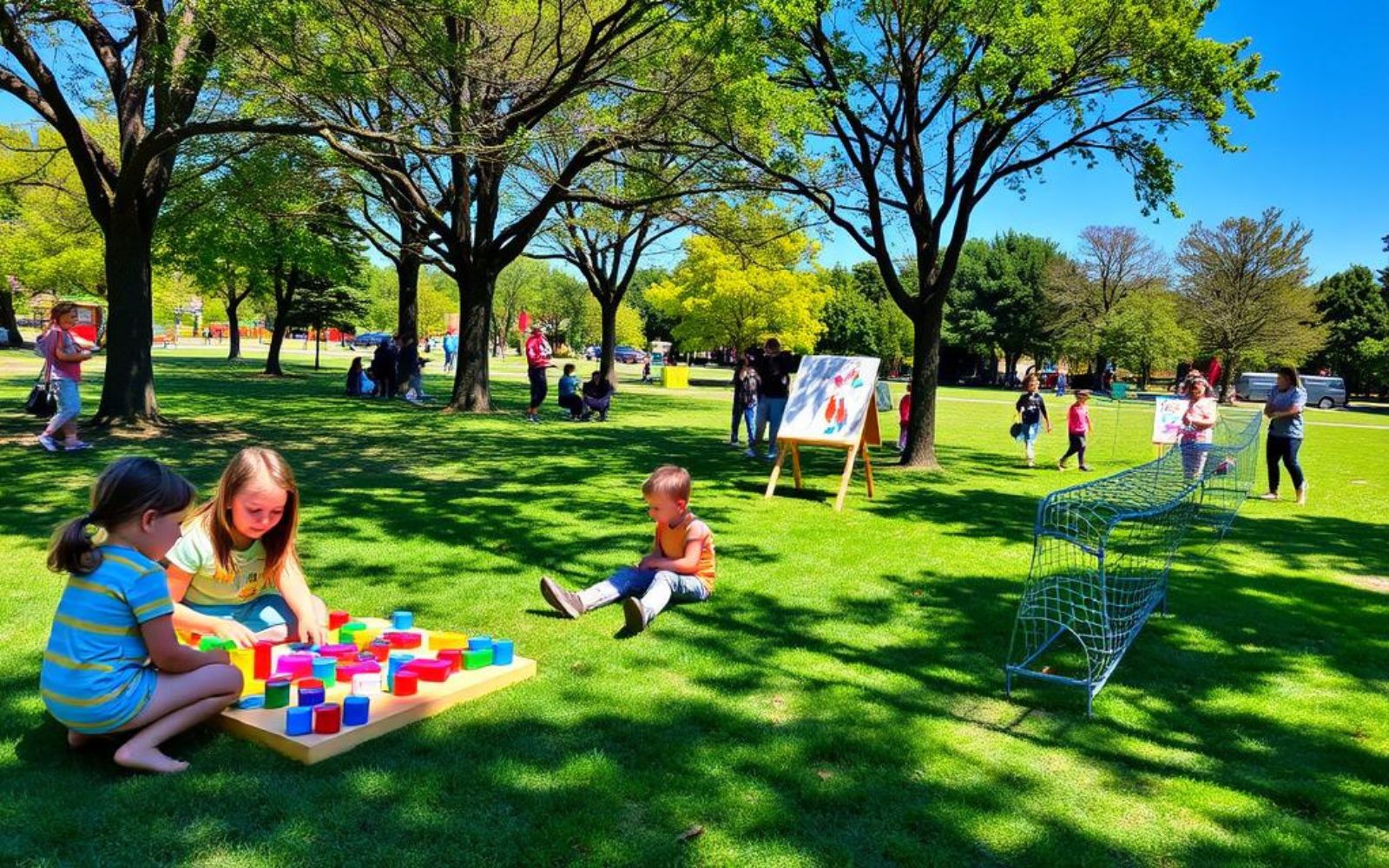Social activities are very important for kids with autism to develop. They help autistic children join in and feel included. By understanding their importance, we can help these kids reach their full potential.
Key Takeaways
- Social activities for kids with autism support emotional and social development
- Inclusive activities for autistic children promote participation and acceptance
- Engaging in social activities helps autistic children develop essential social skills
- A range of indoor, outdoor, and therapeutic activities can support autistic children’s development
- Inclusive activities for autistic children help build confidence and lasting social connections
- Social activities for kids with autism require a supportive and accepting environment
Understanding the Importance of Social Activities for Autistic Children
Social activities are key for kids with autism. They help reduce anxiety and boost confidence. This lets children grow and succeed.
By joining structured social activities for kids with autism, they learn important skills. These include communication, teamwork, and making friends.
- Mental health activities help improve communication skills through autism play therapy.
- Increased confidence and self-esteem
- Enhanced ability to interact with peers and form friendships
Benefits of Structured Social Interaction
Structured social activities give kids with autism a sense of security. They feel safe and know what to expect. This helps them feel like they belong and connect with others.
Building Communication Skills Through Play
Play is a natural way for kids to learn to communicate. Through autism play therapy activities, they can express themselves better. They also learn to understand social cues and develop communication skills.
Creating Safe Social Learning Environments
Creating a safe and supportive learning space is vital for kids with autism. A sensory-safe space makes them feel comfortable and engaged. This allows them to learn important social skills and make lasting friendships.
Social Activities for Kids with Autism: Indoor Options
Indoor activities are awesome for teaching social abilities to kids with autism. Sensory-pleasant sports for youngsters with autism are made only for them. They assist kids learn to take turns, share, and communicate nicely.
Fun activities like cooking or science experiments are great for social skills. They’re fun and help kids feel safe. Using special tools like sensory bins makes these activities even better.
A brightly coloured indoor playroom packed with various attractive remedy sports designed for children with autism, inclusive of sensory containers with textured substances, a smooth play location with climbing structures, art elements scattered round for innovative expression, calm corners with relaxed seating and fidget toys, and interactive video games that inspire social capabilities improvement. The surroundings is heat and alluring, promoting exploration and fun.
- Group art projects, which encourage collaboration and creativity
- Indoor obstacle courses, which promote physical activity and teamwork
- Role-playing activities, which help children develop communication and empathy skills
Indoor activities help kids with autism learn important social skills. They learn to work together, share, and communicate well. These activities make learning fun and help kids grow socially.
Outdoor and Group Activities That Promote Social Development
Outdoor and group activities are key for autistic kids’ social growth. They offer chances to meet friends, form bonds, and learn vital social skills. Places like sensory-friendly playgrounds make socializing safe and fun.
Nature walks are outstanding for kids with autism. They assist kids feel connected to nature, improve their remark skills, and improve their self-confidence.
A colorful outdoor scene offering kids accomplishing sensory-friendly activities, which include playing with gently textured balls, exploring a relaxing nature path, and interacting with oversized foam building blocks, surrounded by way of lush greenery and gentle sunlight filtering through bushes, developing a nonviolent and welcoming ecosystem that encourages social interaction and sensory exploration.
Autism social groups give kids a sense of belonging. These groups have many activities, from games to nature walks. They meet the different needs and interests of autistic kids. Kids learn important social skills like talking, understanding others, and working together.
- Inclusive activities for autistic children, such as sensory-friendly playgrounds
- Sensory-friendly activities for children with autism, like nature exploration
- Team sports adapted for children with autism, such as soccer or T-ball
- Autism social groups for kids, provide a sense of community and belonging
By giving autistic kids these outdoor and group activities, we help them grow socially. They gain the skills and confidence needed to succeed in life.
Incorporating Technology and Creative Expression
Children with autism spectrum disorder (ASD) can really benefit from new ways to learn social skills. Using digital tools and creative outlets helps them grow in social and emotional areas. Autism social groups offer kids great chances to meet others and learn.
Play therapy activities for autism are also very helpful. They can be customized for each child, boosting their confidence and teaching them important social skills. Art and music therapy can also be part of these activities, giving kids a way to express themselves and manage their feelings.
There are many autism support services for kids, like virtual groups and online communities. These places are safe and supportive, letting kids with ASD meet others who understand them. Technology and creativity help kids with ASD build the social skills and confidence they need to do well in life.
Some digital tools for social skills development include:
- Virtual reality programs that mimic real-life social situations
- Online games and apps that teach social skills and emotional intelligence
- Video conferencing platforms for virtual social groups and support groups
A diverse organization of children engaged in various innovative activities in a vibrant, cutting-edge study room. Some youngsters are operating on digital artwork capsules, at the same time as others, however, are constructing models with colorful blocks and engaging in innovative play. Soft herbal light filters through big home windows, creating a heat and alluring ecosystem. The partitions are decorated with vibrant artwork and sensory-friendly objects, promoting inclusivity and interplay among the kids.
By using these tools and methods every day, kids with ASD can improve their social skills and express themselves creatively. This helps them connect with others in meaningful ways.
| Resource | Description |
| Autism Society | Provides information and resources on autism social groups for kids and autism support services for children |
| Autism Speaks | Offers guidance on autism play therapy activities and social development activities for children with ASD |
Frequently Asked Questions (FAQ)
Q: How can I help my autistic child socialize?
Encourage your infant to join group sports and make connections with others in secure and supportive surroundings. Start with structured play, like video games or role-playing, to assist them in practicing social abilities.
Q: What is the best activity for kids with autism?
The first-rate sports are those that healthy your child’s pursuits and desires. Sensory-friendly activities, art, music, or team sports can help develop social skills, communication, and confidence.
Q: What are daily activities for autism?
Daily activities for kids with autism can include routine tasks like brushing teeth, playing simple games, or engaging in calming activities like reading or sensory play. These help improve their focus and communication skills.
Q: How to teach an autistic child to talk?
Use clear, simple language and encourage them to express themselves. Interactive activities like reading together or using picture cards can help them build communication skills. Be patient and give them time to respond.
Final Thoughts
Social Activities are critical for children with autism as they help construct social abilities, verbal exchange, and self-belief. Finding the proper activities that match every child’s wishes could make a large distinction in their improvement. With the right support, those sports foster lasting friendships and an experience of belonging. Parents, instructors, and guide offerings play a critical role in developing these opportunities.


3 thoughts on “Social Activities For Kids With Autism”